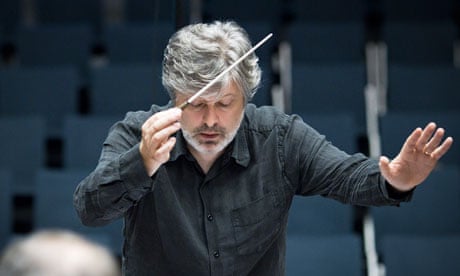What got you started?
I wanted to be a composer from day one. When I was nine, I was given a recorder, and something just clicked. As soon as it became feasible for me to play an instrument, I wanted to write something for it, too: which I did, within days.
What was your big breakthrough?
Writing The Confession of Isobel Gowdie in 1990. It was a Proms commission, which meant it was on the radio and on TV.
Would independence be good for the arts in Scotland?
Oh God, I've been trying to avoid that subject like the plague: I have friends, family and associates on both sides of the argument. But basically, no. I'm a unionist, and I think a breakup would be a financial disaster, not just for the arts, but in every sphere. We've got a bigger world to contend with, and separation flies in the face of all that.
What one song or piece of music could serve as the soundtrack to your life?
The immolation scene from Wagner's Gotterdammerung. It's glorious and cataclysmic, and although it deals with the end of the world, it was one of the first pieces of classical music I fell in love with.
What's the greatest threat to music?
The fact that our society is obsessed with the visual and the verbal. Film, TV and the written word are huge competitors for a reflective art like music. Music is a powerful force that conveys itself quite mysteriously, but it can be a battle to get that message across.
Which artists do you most admire?
Palestrina and Bach. Counterpoint teaches living composers so much, and they were the masters.
What work of art would you like to own?
Salvador Dalí's Christ of St John of the Cross. I'm ambivalent about Dalí, but this is in the Kelvingrove Gallery in Glasgow, and I see it a lot. It stops you in your tracks.
Is there an art form you don't relate to?
Mime has always puzzled me.
What's the worst thing anyone ever said about you?
A Daily Telegraph journalist described me as a "red Clydesider" once. The "red" referred to my politics, and I didn't mind that at the time. But Clydeside? I might live in Glasgow now, but I'm from rural Ayrshire, and I value my Burnsian roots.
Is fame important to you?
It never was, and it isn't now. I don't think people involved in classical music have the same perceptions of fame compared with the more populist arts, where fame seems to be the lifeblood. We're known eventually for what we do, but only by aficionados. And that's the way it should be.
In short
Born: Kilwinning, Ayrshire, 1959.
Career: Works include The Confession of Isobel Gowdie, Veni, Veni Emmanuel and Quickening. He conducts the Guildhall Symphony Orchestra at the Barbican, London EC1 (020-7638 8891), tonight.
Low point: "The occasional block. You feel as if you've dried up."
High point: "Writing a piece for the unveiling of a statue of the founder of Celtic FC. My heart filled with pride."

Comments (…)
Sign in or create your Guardian account to join the discussion